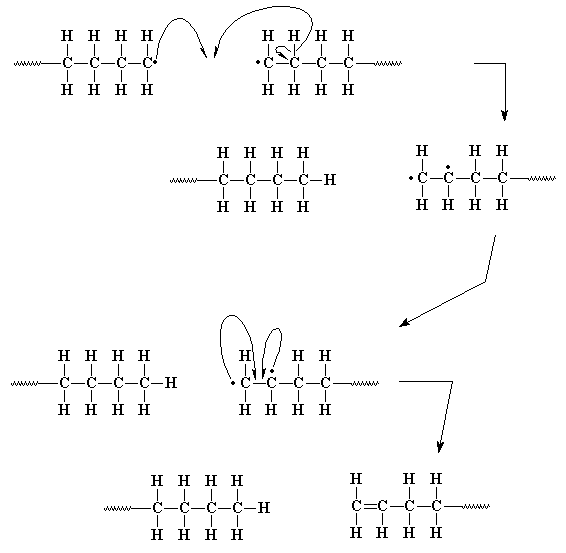Vinyl chloride is an organohalogen compound that has important industrial applications.
Vinyl chloride polymerisation.
Pvc is the world s third most widely produced synthetic plastic polymer after polyethylene and polypropylene about 40 million tons of pvc are produced each year.
The redox initiator systems of this invention are comprised of a a free radical generator such as a peroxide and b a reducing.
Well duh it s similar to polyethylene but on every other carbon in the backbone chain one of the hydrogen atoms is replaced with a chlorine atom.
Structurally pvc is a vinyl polymer.
This polymerisation reaction proceeds by a free radical mechanism.
Pvc ranks as the second most important polymer after ethylene.
Suspension polymerization of vinyl chloride with mixed peroxides 387.
Linear dependence of the m n of the polymer and polymer.
Additives are used to modify the properties of polyvinyl chloride to make it more useful.
Polymerization of vinyl chloride vc with tert butyllithum tert buli was investigated from the point of controlled polymerization the polymerization of vc proceeded at 30 c to give high polymers.
Vinyl chloride is primarily used to make polyvinyl chloride to manufacture plastics.
Suspension polymerization of vinyl chloride in a stirred reactor 385.
The term polyvinyl chloride or pvc indicates homopo1ymers of vinyl chloride and incorrectly copolymers containing amow1ts of vinyl idene chloride vinyl acetage ethylene propylene or acrylates.
About 13 billion kilograms are produced annually.
Being a very well known memb r of the family of vinyl polymers.
Micro suspension polymerization is a technique that it is widely used on a commercial basis for the polymerization of vinyl chloride monomer into polyvinyl chloride.
The effect of stirring rate on particle size in the suspension polymerization of vinyl.
It s produced by the free radical polymerization of vinyl chloride.
Pvc is used in the manufacture of numerous products including packaging films and water pipes.
This invention reveals a greatly improved redox initiator system for use in such polymerizations.
Suspension polymerization of vinyl chloride with a mixture of a suspending agent and a surfactant 385.
Vinyl chloride is a chlorinated hydrocarbon occurring as a colorless highly flammable gas with a mild sweet odor that may emit toxic fumes of carbon dioxide carbon monoxide hydrogen chloride and phosgene when heated to decomposition.
And here my friends is that monomer vinyl chloride.
The m n of the polymers increased as a function of the reaction time and polymer yields although the initiator efficiency was low.
When treated with certain catalysts vinyl chloride monomers undergo polymerization and form the larger compound known as polyvinyl chloride or pvc.
Polyvinyl chloride is a white rigid quite brittle solid.
Vinyl chloride is an organochloride with the formula h 2 c chcl that is also called vinyl chloride monomer vcm or chloroethene this colorless compound is an important industrial chemical chiefly used to produce the polymer polyvinyl chloride pvc.

